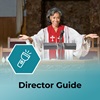My wife and I were visiting Southern California on vacation when we decided to stop by Mission San Juan Capistrano—an adobe chapel complex founded by Franciscan monks in 1776. In the back of the mission was a small replica of the gardens that produced much of the monks' food for hundreds of years.
As I walked through the garden, I noticed a large sign tacked in front of a particularly leafy bush. It read, "Please don't chase or catch our lizards. They lose their tails if you grab them." (Click here to take a peek for yourself.) Sure enough, looking down at the bush I noticed several lizards lounging camouflaged against the leaves. They were ordinary, as lizards go—small and dull-green, with flecks of white or yellow streaked across their slim bodies. Nothing flashy.
But you can probably guess the first thought that went through my mind after reading that sign and getting a look at those lizards—I would like to see a lizard's tail fall off … . If I hadn't been with my wife and young (impressionable) son, I'm sure I would have reached out right then and there and grabbed a lizard just to see what would happen next.
Thus the danger of unintended curriculum.
"For What I Want to Do, I Do Not Do … "
When engaging in any kind of teaching or facilitation experience, we generally approach each lesson with a certain goal in mind. There are specific principles that we would like to explore with our co-learners—certain truths we hope they understand better after our lesson.
That is our intended curriculum. It's what we want to teach.
For example, consider a small-group leader who has structured a discussion around John 3:16: "For God so loved the world that he gave his one and only Son, that whoever believes in him shall not perish but have eternal life." Her intended curriculum would likely include the biblical principles of atonement and redemption.
However, if that leader were to continually stress the idea that Christians "shall not perish but have eternal life" without providing a context or explanation for that terminology, it's possible that a new Christian in the group could come away with the idea that Christians do not experience physical death. That would be an example of unintended curriculum.
The above situation describes the most common form of unintended curriculum—a false belief that is transferred through ignorance about a particular text, or ignorance about proper methods for teaching and facilitation. In other words, unintended curriculum can pop up if a group leader does a poor job of either interpreting or communicating a passage of Scripture.
But there are other forms of unintended curriculum, including the following:
- Environment. The physical or emotional environment of a small-group meeting can itself become a kind of curriculum. If group members sit in a row facing a single teacher, for example, whatever is taught will come to them with an air of authority. This can be a good or a bad thing.
- Priorities. What we continually emphasize as teachers of God's Word says a lot about what we consider valuable—and not valuable. Therefore, our choice of topics can be an influential source of unintended curriculum. For example, consider a youth leader who spends 40 weeks out of a year discussing sexual purity, but only 4 weeks discussing salvation. He could very easily send a message that God is more interested in restricting our behavior than developing a personal relationship with us.
- Personal bias. In a similar way, a leader's opinions on specific subjects can produce an unintended curriculum. Think of a group leader railing against the evils of Darwinian evolution. If she chooses to attack the scientists and scientific principles in support of evolution, she can easily impress her group members with the idea that science in and of itself is dangerous and in conflict with the Bible.
"… But What I Hate, I Do"
Much of the unintended curriculum that is covertly supplied by local churches and small groups is relatively harmless. Theological misinterpretations can be easily corrected by asking questions. Personal biases are regularly overcome through exposure to a variety of teachers and other sources.
But sometimes, unintended curriculum can have deadly and devastating consequences. This happens when a small-group leader, teacher, or preacher unintentionally communicates something false about the nature of Christianity itself.
Boredom is probably the most common example. Put simply, when a small-group leader facilitates a biblically based lesson that is boring to the others in his group, he does more than passively fail to deliver his intended curriculum. He actively teaches the group that the Bible itself is boring. And after continued exposure to such unintended curriculum, the members of that group may conclude that the experience of Christianity as a whole is also boring, and thus not worth pursuing.
The same is true when we fail to help others see how biblical truths can be applied to everyday life. Or when our personal lives and decisions directly contradict what we have taught or communicated in the group. Or when the tenor of a group discussion is caustic and offensive.
Unintended curriculum can also pop up in the ways we handle the personal dynamics of our small groups. As an example, think back to the most annoying person you've ever experienced a small-group meeting with. (No names, please—I just want to get you emotionally involved in this scenario.) Now figure out what was the most annoying or disruptive behavior that this person indulged in. Maybe he tried to answer every question and always talked way too much. Maybe she was very judgmental and routinely put down other members of the group. Maybe he fell asleep all the time.
Whatever the behavior was, the response of the group leader (and the group as a whole) taught something to that individual—and to the rest of the group. If the behavior was ignored or left unaddressed, it implied that the negative behavior was, in fact, acceptable. And chances are that the behavior continued until the group either learned to live with it, disbanded, or eventually asked the person to leave. This obviously was not the intention of the leader or the group—it was unintended curriculum.
What You Can Do
My goal in pointing out the nature and reality of unintended curriculum is not to make you paranoid as a small-group leader or teacher. I don't think it would be profitable for all of us to spend hours examining and re-examining our discussion questions and teaching outlines in search of any train of thought that could potentially be boring or offensive.
But I would like us to take a step back every now and then and try to examine the small groups we lead from the perspective of those who experience them. Better yet, I would like us to solicit feedback from our group members. What sticks out to them during group meetings? What have they learned in recent weeks? What did they like? What did they dislike? Were they offended by anything that was said? Were they excited?
Taking the time to evaluate ourselves and the experience of our groups will do wonders to make sure that people are learning what we intend to teach them—and nothing more.
—Sam O'Neal; copyright 2008 by the author and Christianity Today.









